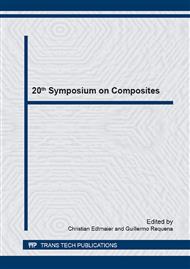p.663
p.671
p.677
p.687
p.695
p.699
p.707
p.715
p.724
Spinning of Staple Hybrid Yarn from Carbon Fiber Wastes for Lightweight Constructions
Abstract:
The reuse of CF-wastes (rCF) is desirable due to the energy-intensive manufacturing, high price and the disposal problem of carbon fibers. It is a challenging process to spin yarn from rCFs in a short staple spinning production line which ensures a much higher strength later in the manufacturing of CFRP (carbon fiber reinforced plastics) parts than that of the parts from rCF-nonwovens or, from short-fiber reinforced injection molded parts. This spinning technology consists of several subsequent processes such as carding, drafting and spinning on a flyer frame. It is possible to produce hybrid yarn up to 2000 tex, which fineness is similar like a roving. The machines used to produce yarn for this purpose were specially modified and adapted, so that the brittle CF can be processed smoothly. Carded and draw frame slivers with different fiber lengths and mixing ratios were produced and later the high-quality hybrid yarn has been spun with different yarn twists.
Info:
Periodical:
Pages:
695-698
Citation:
Online since:
July 2015
Authors:
Keywords:
Price:
Сopyright:
© 2015 Trans Tech Publications Ltd. All Rights Reserved
Share:
Citation:


